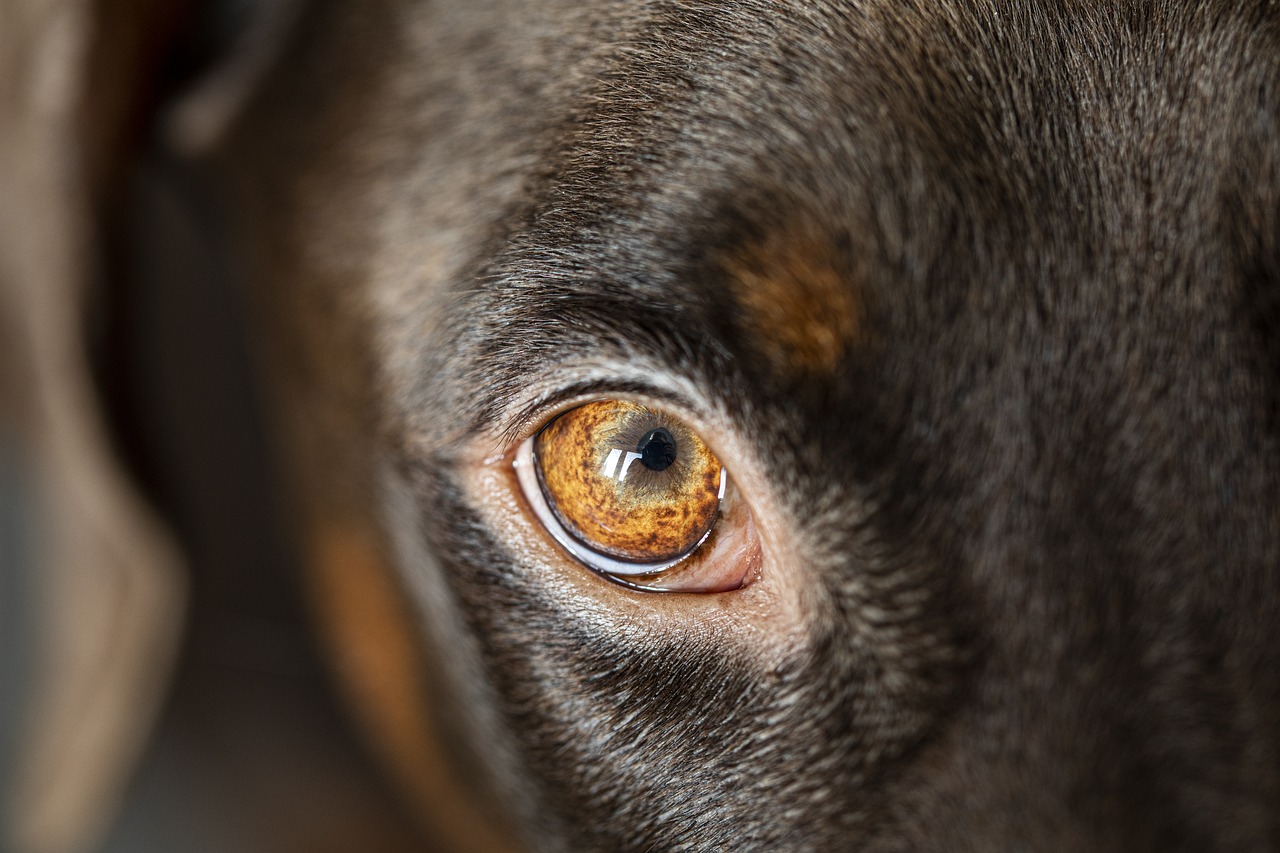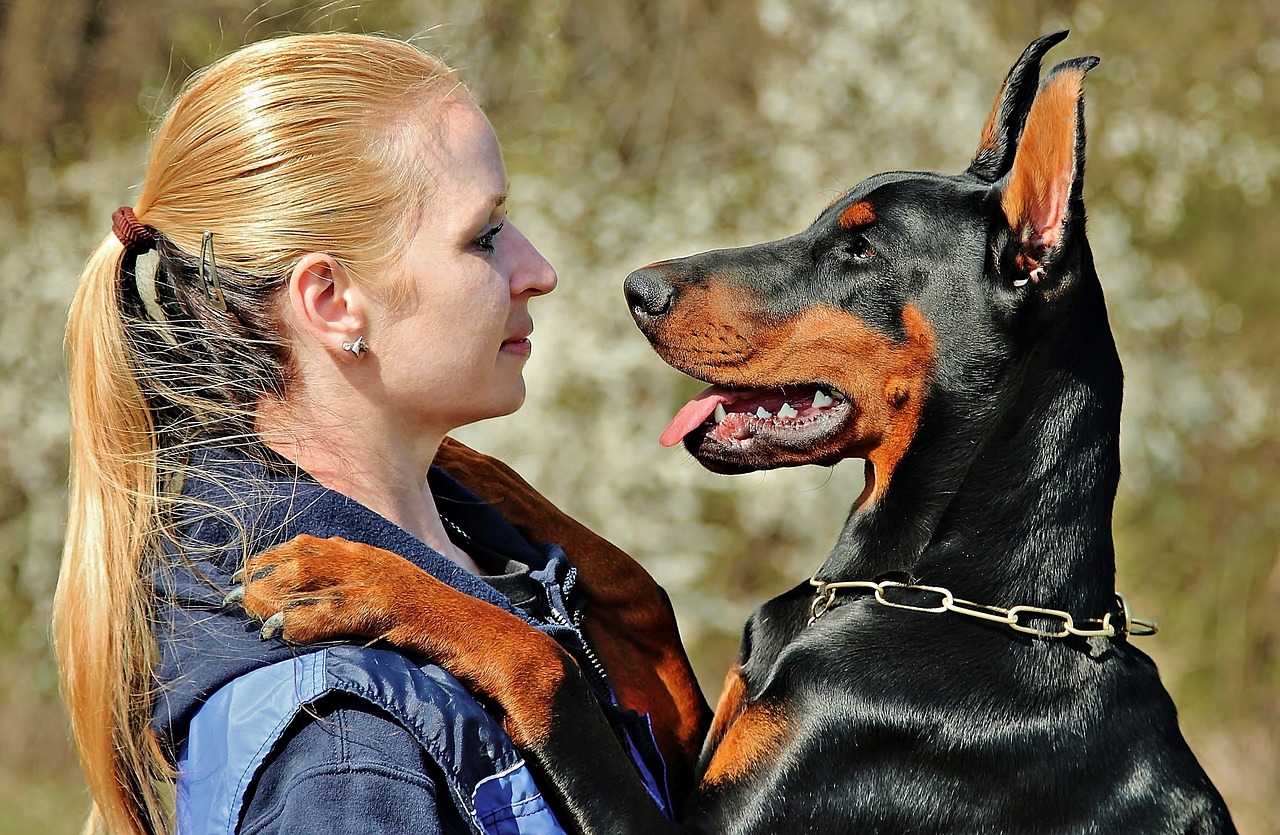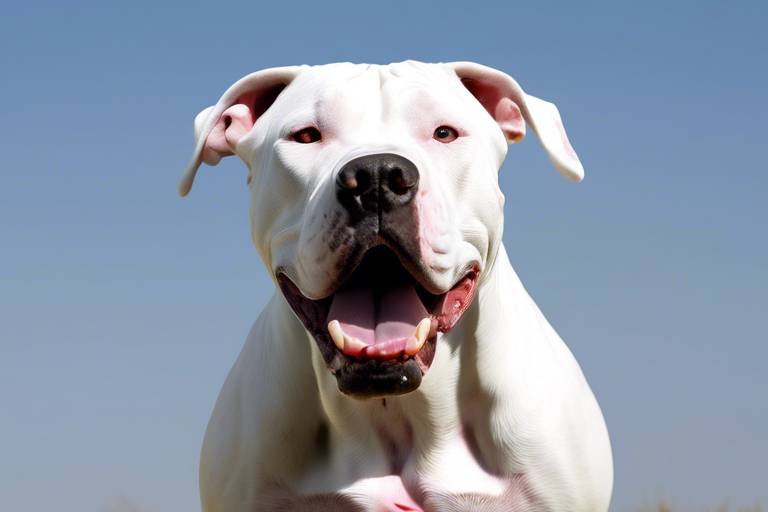The Unique Characteristics of the Doberman - Loyalty and Intelligence
Dobermans are not just dogs; they are remarkable companions that embody loyalty and intelligence in every fiber of their being. These dogs have a unique blend of traits that make them stand out in the canine world. From their striking appearance to their unwavering devotion, Dobermans capture the hearts of those who encounter them. But what exactly makes these dogs so special? In this article, we will dive deep into the history, temperament, and health of Dobermans, giving you a comprehensive understanding of what it means to share your life with one of these extraordinary animals.
The Doberman breed has a fascinating history, originating in Germany in the late 19th century. The breed was developed by a tax collector named Karl Friedrich Louis Dobermann, who wanted a loyal and protective companion to accompany him during his rounds. This need for protection led him to create a breed that combined the best traits of various dogs, including the Rottweiler, Greyhound, and German Pinscher. The result was a dog that was not only intelligent but also highly trainable and fiercely loyal. Over the years, Dobermans have been utilized in various roles, from police and military work to serving as therapy dogs, showcasing their versatility and adaptability.
When it comes to personality, Dobermans are a mixed bag of traits that make them truly unique. They are known for their distinct personalities, which can range from playful and affectionate to serious and protective. Their loyalty is unmatched; once they bond with their family, they will go to great lengths to protect them. It's important to note that while they can be reserved around strangers, they are incredibly loving and affectionate towards their families. This duality makes them excellent companions and watchdogs. The key to understanding a Doberman's temperament lies in recognizing their need for social interaction and mental stimulation, which can prevent behavioral issues.
Loyalty is a hallmark of the Doberman breed. This loyalty manifests in their relationships with family members, often resulting in a deep emotional connection. Dobermans are known to be affectionate and protective, always keeping a watchful eye on their loved ones. They thrive on companionship and are happiest when they are part of family activities. This bond can be enhanced through consistent training and socialization, leading to a well-adjusted dog that feels secure in their role within the family unit.
Understanding how Dobermans bond with their owners can enhance the human-animal relationship significantly. These dogs are incredibly intuitive and can sense the emotions of their owners, often responding with affection or support when needed. This connection is not just built on physical presence; it involves emotional engagement as well. Spending quality time with your Doberman, whether through play, training, or simply relaxing together, helps to strengthen this bond.
Dobermans are naturally protective, a trait that has been bred into them over generations. This instinctual behavior to guard their families and properties makes them excellent watchdogs. They are often wary of strangers, which can serve as an effective deterrent to potential intruders. However, it’s essential to balance their protective instincts with proper training and socialization. A well-socialized Doberman can differentiate between a friend and a foe, ensuring that their protective nature does not lead to unnecessary aggression.
One of the standout features of Dobermans is their intelligence. They are highly intelligent dogs, known for their quick learning abilities. This intelligence makes them exceptional learners, excelling in obedience training and various canine sports. Dobermans thrive on mental challenges, and engaging them in activities like agility training or advanced obedience can keep them mentally stimulated. Their eagerness to please their owners often results in a strong desire to learn, making training sessions enjoyable for both the dog and the owner.
Like all breeds, Dobermans are prone to certain health issues. Some common health concerns include hip dysplasia, heart conditions, and certain types of cancers. Regular veterinary check-ups and a proactive approach to health care can help in early detection and management of these issues. Potential owners should educate themselves about these health risks to ensure that they can provide the best care possible for their Doberman.
Proper diet and nutrition are crucial for a Doberman's health. A well-balanced diet that includes high-quality protein, healthy fats, and essential vitamins and minerals is vital. Dobermans are active dogs, and their nutritional needs can vary based on their age, activity level, and overall health. Consulting with a veterinarian can help owners determine the best feeding practices to keep their Doberman healthy and energetic.
Dobermans require regular exercise to maintain their physical and mental health. These energetic dogs thrive on activities that challenge them both physically and mentally. Daily walks, playtime, and structured activities like obedience training or agility courses can keep them fit and happy. Without adequate exercise, Dobermans may become bored and develop undesirable behaviors, so it's essential to establish a routine that meets their exercise needs.
In conclusion, the Doberman’s unique characteristics of loyalty and intelligence make them exceptional companions. Understanding their needs and traits can enhance the experience of owning this remarkable breed. Whether you're drawn to their protective nature, their playful spirit, or their unwavering loyalty, a Doberman can bring joy and fulfillment to any household.
- Are Dobermans good with children? Yes, with proper training and socialization, Dobermans can be excellent family dogs and are known to be gentle with children.
- How much exercise do Dobermans need? Dobermans require at least an hour of exercise each day to keep them healthy and happy.
- Do Dobermans shed a lot? Dobermans have a short coat and shed moderately, requiring regular brushing to manage loose hair.
- Are Dobermans easy to train? Yes, due to their intelligence and eagerness to please, Dobermans are generally easy to train.

[History of the Doberman]
The Doberman breed has a fascinating history that dates back to the late 19th century in Germany. It all began with a tax collector named Karl Friedrich Louis Dobermann, who sought to create a loyal and protective companion to accompany him during his rounds. Living in a time when criminals were prevalent, Dobermann wanted a dog that would not only guard him but also be a reliable partner in his work. This desire led to the careful selection and breeding of various dog breeds, including the Rottweiler, Greyhound, and German Pinscher, resulting in the birth of the Doberman Pinscher.
Initially, the Doberman was bred for utility, serving as a guard dog and a protector. Their strong build, keen intelligence, and unwavering loyalty made them ideal for this role. As the breed gained popularity, it was recognized for its versatility, excelling not just in protection but also in obedience and agility. By the early 20th century, Dobermans began to make their mark in various fields, including police and military work, search and rescue missions, and as service dogs for individuals with disabilities.
Throughout the years, the breed has undergone selective breeding to enhance specific traits. This has led to the emergence of two distinct types of Dobermans: the American Doberman and the European Doberman. While both share the same core characteristics, they differ in appearance and temperament due to the varying breeding practices in the United States and Europe.
Today, the Doberman is celebrated not only for its striking appearance but also for its incredible intelligence and loyalty. They have transitioned from being solely working dogs to beloved family pets. Their history is a testament to the bond that can form between humans and dogs when nurtured with care and understanding.
| Key Milestones in Doberman History | Year |
|---|---|
| Creation of the Doberman breed by Karl Friedrich Louis Dobermann | Late 1890s |
| First Doberman Pinscher Club founded in Germany | 1899 |
| Recognition by the American Kennel Club (AKC) | 1908 |
| Dobermans used in military and police work | World War I and II |
In summary, the Doberman's history is rich and multifaceted, reflecting its evolution from a working dog to a cherished family companion. Understanding this background not only deepens our appreciation for the breed but also highlights the incredible journey that has shaped the Doberman into the loyal and intelligent dog we know today.

[Temperament and Personality]
The Doberman is not just a dog; it's a loyal companion, a protector, and a friend. Their distinct personalities set them apart from many other breeds, making them a popular choice among dog lovers. One of the most notable traits of Dobermans is their incredible loyalty. When you bring a Doberman into your home, you're not just gaining a pet; you're welcoming a devoted guardian who will stand by your side through thick and thin.
These dogs are known for their affectionate nature towards their families. They thrive on human interaction and often seek to be close to their owners. Dobermans have an innate ability to sense emotions, making them incredibly empathetic companions. If you're feeling down, your Doberman will be right there, offering comfort with a gentle nudge or a warm gaze. This emotional connection is what makes them such cherished family members.
However, it’s important to note that Dobermans can also be quite protective. This protective instinct arises from their history as guard dogs. They are naturally suspicious of strangers and will not hesitate to defend their home and loved ones if they sense a threat. This characteristic can be a double-edged sword; while it makes them excellent watchdogs, it also requires responsible training and socialization from a young age to ensure they are well-adjusted and friendly.
To better understand the temperament of Dobermans, let’s break down their key personality traits:
- Loyalty: Dobermans are fiercely loyal to their families and will go to great lengths to protect them.
- Affectionate: They are known for their loving nature and enjoy being close to their owners.
- Intelligent: Dobermans are highly trainable and excel in obedience training.
- Protective: Their instinct to guard can make them wary of strangers, but this can be managed with proper training.
Understanding these traits is essential for anyone considering bringing a Doberman into their life. They require a firm yet loving hand in training to channel their protective instincts positively. Early socialization is crucial, as it helps them distinguish between friends and potential threats, ensuring they grow into well-rounded adults.
In summary, the Doberman's temperament is a beautiful blend of loyalty, affection, intelligence, and protectiveness. They are not just dogs; they are family members who offer unwavering support and companionship. If you're looking for a breed that will stand by you, challenge you intellectually, and shower you with love, a Doberman might just be the perfect fit.
Here are some common questions about Doberman temperament and personality:
- Are Dobermans good with children? Yes, with proper training and socialization, Dobermans can be excellent companions for children.
- Do Dobermans need a lot of exercise? Absolutely! They are energetic dogs that require regular physical activity to stay healthy and happy.
- Can Dobermans be left alone for long periods? They thrive on companionship and may become anxious if left alone for too long.
[Loyalty to Family]
When you think of a Doberman, one of the first traits that come to mind is their **unwavering loyalty** to their families. This breed doesn't just see you as an owner; they see you as their **pack leader**. Their loyalty is profound, often manifesting in ways that can surprise even seasoned dog owners. For instance, have you ever noticed how a Doberman will follow you from room to room, ensuring they are never too far away? This behavior is not just a quirk; it’s a testament to their instinctual need to stay close to their loved ones.
But what does this loyalty really mean in day-to-day life? It means that your Doberman will be there for you during both the highs and lows. Whether you are celebrating a joyous occasion or feeling down, your Doberman will sense your emotions and respond with affection and support. They have an incredible ability to read human emotions, often acting as a comforting presence when you need it the most. Imagine having a companion who can sense your mood and react accordingly; that’s the magic of a Doberman's loyalty.
Moreover, this loyalty extends beyond emotional support. Dobermans are known for their **protective instincts**, and this is where their loyalty takes on a more serious tone. They are naturally inclined to guard their families and homes, often becoming vigilant watchdogs. This protective nature can be both a blessing and a responsibility. While you can feel safe knowing your Doberman is on alert, it’s essential to train them properly to differentiate between normal visitors and potential threats. A well-trained Doberman will not only protect you but will also know when to relax and enjoy the company of friends and family.
To illustrate the depth of their loyalty, consider the following traits that highlight the bond between Dobermans and their families:
- Attachment: Dobermans form strong attachments to their human family members, often choosing a favorite person they will be particularly loyal to.
- Alertness: They are naturally alert and will keep a watchful eye on their surroundings, ensuring their family is safe.
- Affection: Dobermans are affectionate by nature, often seeking physical closeness and enjoying cuddles, which reinforces their bond with you.
In summary, the loyalty of a Doberman is **multi-faceted**. It’s not just about being a protector or a companion; it’s about forming a deep, emotional connection that enriches both the dog’s life and yours. Their loyalty can turn a house into a home and make every day feel a little brighter. As you embark on the journey of owning a Doberman, remember that this loyalty is a two-way street. The more love and attention you give, the more loyal your furry friend will be. So, are you ready to experience this incredible bond?
Q: How do I strengthen the bond with my Doberman?
A: Spend quality time together, engage in training sessions, and provide plenty of affection. Regular exercise and playtime can also enhance your relationship.
Q: Are Dobermans good with children?
A: Yes, Dobermans can be great with children if socialized properly from a young age. They are protective and often develop strong bonds with family members.
Q: How can I ensure my Doberman is well-behaved?
A: Consistent training, socialization, and positive reinforcement are key. Dobermans thrive on mental challenges, so consider engaging them in obedience classes or agility training.
[Bonding with Owners]
When it comes to the Doberman breed, the bond they form with their owners is nothing short of extraordinary. These dogs are not just pets; they become integral members of the family. Their loyalty and affectionate nature create a strong emotional connection that can be both heartwarming and profound. Imagine coming home after a long day, and the moment you step through the door, your Doberman greets you with a wagging tail and an excited bark, as if to say, "I've missed you!" This kind of enthusiasm is a testament to the deep bond they share with their humans.
One of the most remarkable aspects of Dobermans is their ability to read human emotions. They are incredibly intuitive and can sense when their owners are feeling down or stressed. In those moments, a Doberman might nuzzle closer, offering comfort and companionship, almost as if they understand the weight of the world resting on your shoulders. This emotional intelligence is what sets them apart from many other breeds.
To foster this bond, it's essential for owners to engage in activities that strengthen their relationship. Regular playtime, training sessions, and simply spending quality time together can significantly enhance the connection. Here are some activities that can help in bonding:
- Training Sessions: Teaching your Doberman new tricks or commands not only stimulates their mind but also reinforces your role as a leader and caregiver.
- Playtime: Engaging in games like fetch or tug-of-war can be a fun way to interact, allowing your Doberman to expend energy while strengthening your bond.
- Daily Walks: Taking long walks together not only provides physical exercise but also offers opportunities for exploration and connection.
Moreover, Dobermans are known for their protective instincts. This trait often translates into a strong desire to be close to their owners, ensuring their safety and well-being. They thrive on routine and consistency, which helps them feel secure in their environment. Owners who establish a predictable schedule for feeding, walks, and playtime will likely see their Doberman flourish, both emotionally and behaviorally.
In summary, the bond between a Doberman and its owner is built on trust, love, and mutual respect. By investing time and effort into nurturing this relationship, owners can enjoy a fulfilling companionship that is both rewarding and enriching. The loyalty and affection that Dobermans offer in return is truly unparalleled, making them not just pets, but lifelong friends.
- How can I strengthen my bond with my Doberman? Regular training, playtime, and quality moments spent together can significantly enhance your relationship.
- Are Dobermans good with children? Yes, Dobermans can be excellent companions for children when properly socialized and trained from a young age.
- What should I do if my Doberman shows signs of separation anxiety? Gradually increase the time your Doberman spends alone and provide engaging toys or activities to keep them occupied.
[Protective Nature]
Dobermans are often regarded as the ultimate guardians, and for good reason. Their protective nature is deeply ingrained in their DNA, stemming from their historical role as protectors and companions. Imagine having a loyal friend who not only stands by your side but also has an innate ability to sense danger. This is precisely what a Doberman brings to the table. Their keen intelligence and heightened senses allow them to assess situations swiftly, making them alert watchdogs.
When it comes to family, a Doberman's protective instincts kick in full force. They are naturally inclined to guard their loved ones, often forming a strong bond with each member of the household. This loyalty translates into a fierce desire to protect, which can manifest in various ways:
- Alertness: Dobermans are always on the lookout. They can detect unusual sounds or movements, making them vigilant guardians.
- Defensive Behavior: In the face of perceived threats, Dobermans may exhibit protective stances, standing tall and ready to defend their territory.
- Intuitive Reactions: Their ability to read human emotions allows them to sense when their owners are anxious or fearful, prompting them to take action.
This protective nature is not just about aggression; it’s also about affection. A Doberman's instinct to protect often goes hand-in-hand with their desire to be close to their families. They thrive on companionship, and this bond can lead to an incredible sense of security for their owners. When a Doberman is by your side, you can feel a profound sense of safety, knowing that your furry friend is always ready to stand guard.
However, it’s essential to channel this protective instinct properly. Early socialization and training are crucial in ensuring that a Doberman’s protective nature is balanced with good behavior. Without proper guidance, their protective instincts could become overwhelming or misdirected. Owners should engage in positive reinforcement training, teaching them when to be alert and when to relax. This not only enhances their protective abilities but also strengthens the bond between the dog and its owner.
In essence, a Doberman's protective nature is a double-edged sword. It can provide a sense of safety and security, but it requires responsible ownership to ensure that it manifests in a positive way. With the right approach, a Doberman can be both a loving companion and a steadfast protector, making them one of the most desirable breeds for families seeking both loyalty and security.
- Are Dobermans good with children? Yes, Dobermans can be excellent family dogs when properly socialized, and they often develop strong bonds with children.
- How can I ensure my Doberman is well-protected? Regular training and socialization from an early age will help your Doberman learn appropriate protective behaviors.
- Do Dobermans require a lot of exercise? Absolutely! Dobermans are energetic dogs that need regular exercise to stay healthy and happy.
- What should I do if my Doberman is overly protective? Consult with a professional trainer who can help you manage and guide your Doberman’s protective instincts effectively.
[Intelligence and Trainability]
The Doberman breed is often celebrated for its remarkable intelligence and exceptional trainability. These dogs don't just have a good sense of smell or an impressive physique; they possess a mental acuity that sets them apart from many other breeds. Imagine having a dog that can not only follow commands but also anticipate your needs and respond to your emotions! This breed is like a loyal partner in crime—always ready to learn and eager to please.
One of the standout features of Dobermans is their ability to learn quickly. They thrive on mental stimulation and can grasp new commands in a matter of minutes. In fact, they often rank among the top 5% of dog breeds in terms of intelligence. This means that with the right training, they can master a variety of tasks and tricks. For instance, Dobermans are frequently used in roles such as police dogs, service dogs, and even search and rescue dogs. Their sharp minds allow them to excel in these demanding positions, showcasing not only their intelligence but also their desire to work alongside humans.
When it comes to training, consistency and positive reinforcement are key. A Doberman responds best to a training style that is both firm and loving. They thrive in environments where they can engage both physically and mentally. For example, incorporating obedience training with fun activities like agility courses can keep them interested and motivated. Here are some tips for training your Doberman:
- Start Early: Begin training as a puppy to instill good habits from the start.
- Use Positive Reinforcement: Reward good behavior with treats, praise, or playtime.
- Be Consistent: Use the same commands and cues to avoid confusing your dog.
- Keep Sessions Short: Limit training sessions to 10-15 minutes to maintain their focus.
Moreover, the bond you create with your Doberman during training is invaluable. They are not just learning commands; they are also learning to trust you and understand your expectations. This relationship enhances their willingness to obey and perform tasks, making training a rewarding experience for both of you. Think of it as a dance—when you lead, they follow, and together you create a beautiful rhythm of communication.
However, it’s essential to remember that a Doberman’s intelligence can sometimes lead to stubbornness. If they sense that they can get away with ignoring a command, they might test the waters. This highlights the need for a confident handler who can establish clear boundaries and maintain authority without resorting to harsh methods. By using gentle yet assertive techniques, you can channel their intelligence into productive behaviors, ensuring they remain well-mannered companions.
In conclusion, the Doberman’s intelligence and trainability make them not just pets, but full-fledged family members who can participate in various activities and roles. With the right approach, you can unlock the full potential of this incredible breed, turning them into a loyal and obedient companion who is as sharp as a tack!
- How intelligent are Dobermans compared to other breeds? Dobermans rank among the top 5% of dog breeds in intelligence, making them highly trainable.
- What training methods work best for Dobermans? Positive reinforcement, consistency, and early socialization are key to successful training.
- Can Dobermans learn complex commands? Yes, they can learn a variety of commands and tasks, often mastering them quickly.
- Are Dobermans suitable for first-time dog owners? While they are intelligent and trainable, they require an experienced handler to guide their training effectively.

[Common Health Issues]
The Doberman is a robust and athletic breed, but like all dogs, they are not without their health challenges. Understanding these common health issues is crucial for potential owners to ensure a long and healthy life for their furry companions. One of the most prevalent concerns in Dobermans is cardiomyopathy, a heart condition that can lead to sudden cardiac death. This condition affects the heart muscle, making it less effective at pumping blood. Regular veterinary check-ups and heart screenings can help in early detection.
Another issue that Dobermans may face is hip dysplasia, a genetic condition where the hip joint doesn't fit properly into the hip socket. This can lead to arthritis and pain. It’s essential to provide a balanced diet and maintain a healthy weight to mitigate the risk of hip dysplasia. Additionally, von Willebrand's disease is a bleeding disorder that is common in Dobermans, caused by a deficiency in a clotting protein. Owners should be aware of this condition, as it can complicate surgeries and injuries.
To give you a clearer picture of these health issues, here’s a table summarizing the common health concerns associated with Dobermans:
| Health Issue | Description | Preventative Measures |
|---|---|---|
| Cardiomyopathy | A heart condition that can lead to sudden cardiac death. | Regular heart screenings and veterinary check-ups. |
| Hip Dysplasia | A genetic condition affecting the hip joint, leading to arthritis. | Balanced diet and maintaining a healthy weight. |
| Von Willebrand's Disease | A bleeding disorder caused by a deficiency in a clotting protein. | Regular veterinary assessments and careful monitoring. |
In addition to these specific conditions, Dobermans may also suffer from other health issues such as skin allergies, thyroid problems, and progressive retinal atrophy. It’s essential for Doberman owners to stay informed about these potential health risks. Regular check-ups, a nutritious diet, and appropriate exercise can significantly enhance their quality of life.
Being proactive about your Doberman’s health can make all the difference. It’s not just about treating problems as they arise; it’s about creating an environment where your Doberman can thrive. By understanding these common health issues, you’re taking the first step towards ensuring a happy and healthy life for your loyal companion.
Q: What is the average lifespan of a Doberman?
A: The average lifespan of a Doberman is typically between 10 to 12 years, but with proper care, some can live even longer.
Q: Are Dobermans prone to specific allergies?
A: Yes, Dobermans can be prone to skin allergies, which may manifest as itching, redness, or inflammation. Regular grooming and a proper diet can help manage these issues.
Q: How often should I take my Doberman to the vet?
A: Regular veterinary check-ups are recommended at least once a year. However, if your Doberman shows any signs of illness or discomfort, you should consult your veterinarian immediately.
Q: What kind of diet is best for a Doberman?
A: A high-quality, balanced diet that is appropriate for their age, size, and activity level is essential. Consult your veterinarian for specific dietary recommendations.
Q: How much exercise does a Doberman need?
A: Dobermans are energetic dogs that require at least 1 to 2 hours of exercise daily. Activities can include walks, runs, and playtime to keep them physically and mentally stimulated.
[Diet and Nutrition]
When it comes to keeping your Doberman healthy and happy, diet and nutrition play a crucial role. These dogs are not just beautiful and intelligent; they also have specific dietary needs that must be met to ensure their overall well-being. A well-balanced diet will not only support their physical health but also contribute to their mental sharpness, which is essential for this highly trainable breed.
Dobermans are large, active dogs that require a diet rich in high-quality proteins, healthy fats, and essential vitamins and minerals. A good rule of thumb is to choose dog food that lists meat as the first ingredient. This could include chicken, beef, or fish, which are all excellent sources of protein. Additionally, look for foods that contain whole grains or vegetables, as these provide necessary carbohydrates and fiber.
To give you a better understanding of the nutritional requirements for Dobermans, here’s a simple breakdown:
| Nutrient | Recommended Amount |
|---|---|
| Protein | 20-30% of total diet |
| Fat | 8-15% of total diet |
| Carbohydrates | 30-50% of total diet |
| Fiber | 2-5% of total diet |
| Vitamins and Minerals | As per guidelines |
It's important to note that Dobermans can be prone to certain health issues, such as dilated cardiomyopathy and hip dysplasia. Therefore, incorporating supplements that support heart health and joint function can be beneficial. Always consult with your veterinarian before introducing any new supplements to ensure they are appropriate for your dog's specific health needs.
Feeding schedules are also vital. Most Dobermans thrive on two meals a day, spaced out to prevent bloating, a condition that they can be susceptible to. Make sure to measure their food portions to avoid overfeeding, which can lead to obesity and other health complications. If you're unsure about the right amount to feed your Doberman, your vet can provide tailored advice based on your dog's age, weight, and activity level.
Another key aspect of a Doberman's diet is hydration. Always ensure that your dog has access to fresh, clean water. Dehydration can lead to serious health issues, especially in active breeds like Dobermans. If you notice your dog is drinking more or less than usual, it may be time to consult your veterinarian.
In summary, providing a well-balanced diet tailored to your Doberman's needs is essential for their health and longevity. By focusing on quality ingredients, maintaining proper feeding schedules, and ensuring hydration, you’re setting your furry friend up for a happy, healthy life.
- What is the best food for a Doberman? Look for high-quality dog food that lists meat as the first ingredient and contains a good balance of protein, fat, and carbohydrates.
- How often should I feed my Doberman? Most Dobermans do well on two meals a day, spaced out to avoid bloating.
- Should I give my Doberman supplements? Consult with your veterinarian about any necessary supplements, especially if your Doberman has specific health concerns.
- How can I tell if my Doberman is overweight? You should be able to feel your dog’s ribs without excess fat covering. If you cannot, consult your vet for a proper assessment.
[Exercise Needs]
When it comes to keeping a Doberman happy and healthy, exercise is paramount. These dogs are not just your average pets; they are energetic, athletic, and full of life. If you’re thinking about bringing a Doberman into your home, prepare yourself for a commitment to their exercise needs. Imagine having a workout buddy that never gets tired—that’s your Doberman! Regular physical activity is crucial for their well-being, both physically and mentally. Without enough exercise, these intelligent dogs can become bored, which may lead to destructive behaviors.
So, what does a typical exercise routine look like for a Doberman? Ideally, they should get at least 1 to 2 hours of exercise each day. This can include a mix of activities such as walks, runs, play sessions, and even agility training. Here’s a breakdown of some effective ways to keep your Doberman engaged and active:
- Daily Walks: Aim for at least two walks a day. Not only does this provide physical exercise, but it also offers mental stimulation as they explore their surroundings.
- Running: Dobermans are natural runners. If you enjoy jogging, take your furry friend along with you. They’ll love the speed and thrill of the chase!
- Interactive Play: Games like fetch or tug-of-war can be incredibly rewarding. These activities not only help burn off energy but also strengthen the bond between you and your dog.
- Agility Training: Enroll in agility classes or set up an obstacle course in your backyard. This will challenge their minds and bodies, keeping them sharp and fit.
It's important to note that Dobermans thrive on routine. Establishing a consistent exercise schedule will help them feel secure and happy. Additionally, keep an eye on the weather; Dobermans can be sensitive to extreme temperatures. During hot days, opt for early morning or late evening walks to avoid overheating. Conversely, in colder months, make sure they are warm enough, especially if you live in a particularly chilly area.
In summary, meeting the exercise needs of a Doberman is not just about keeping them fit; it’s about nurturing their spirit and ensuring they lead a fulfilling life. When you invest time in their exercise, you’ll find that your Doberman will reward you with loyalty, affection, and a zest for life that is truly infectious.
Q: How much exercise does a Doberman need daily?
A: Dobermans require at least 1 to 2 hours of exercise each day, which can be a combination of walks, runs, and playtime.
Q: Can Dobermans live in apartments?
A: Yes, but they need ample exercise and mental stimulation. Regular outings and playtime are essential to keep them happy in an apartment setting.
Q: What types of activities are best for Dobermans?
A: Activities like running, agility training, fetch, and interactive play are ideal for keeping Dobermans engaged and healthy.
Q: How can I tell if my Doberman is getting enough exercise?
A: If your Doberman is calm at home and not engaging in destructive behaviors, they are likely getting enough exercise. If they seem restless or anxious, they may need more activity.

[Conclusion]
In conclusion, the Doberman stands out as a breed that embodies both loyalty and intelligence, making them exceptional companions for those fortunate enough to share their lives with one. Their rich history, dating back to late 19th century Germany, reveals a breed that was meticulously developed for protection and companionship. The Doberman's temperament is a beautiful blend of affection and vigilance, ensuring that they not only serve as loving family members but also as formidable guardians.
Understanding the unique characteristics of Dobermans can significantly enhance the experience of owning one. Their loyalty is not just a trait; it’s a way of life for them. They form deep emotional connections with their families, often going above and beyond to protect their loved ones. This protective nature is instinctual, making them excellent watchdogs who are always alert to potential threats.
Moreover, their intelligence and trainability set them apart from many other breeds. Dobermans thrive on mental stimulation and challenges, which makes training not only effective but also a rewarding experience for both the dog and the owner. With proper guidance, they can excel in various activities—from obedience to agility and even service roles.
However, like all breeds, Dobermans are prone to certain health issues. Potential owners should be aware of these concerns and take proactive measures to ensure their furry friend lives a long, healthy life. This includes providing a balanced diet, regular exercise, and routine veterinary care. By addressing their physical and mental needs, you can help your Doberman flourish.
Ultimately, the Doberman’s combination of loyalty, intelligence, and protective nature makes them a breed worth considering for anyone looking for a devoted companion. They are not just dogs; they are family members who will stand by your side through thick and thin. If you’re ready to embrace the joys and responsibilities that come with owning a Doberman, you’re in for a rewarding journey filled with love and companionship.
- Are Dobermans good with children? Yes, Dobermans can be very affectionate and protective towards children, making them great family pets when properly socialized.
- How much exercise do Dobermans need? Dobermans are high-energy dogs that require at least 1-2 hours of exercise daily to stay healthy and happy.
- What are common health issues in Dobermans? Some common health concerns include hip dysplasia, heart issues, and certain types of cancer. Regular veterinary check-ups can help monitor their health.
- How trainable are Dobermans? Dobermans are highly trainable due to their intelligence and eagerness to please. Consistent training methods work best for them.
- Do Dobermans require special diets? Yes, a balanced diet tailored to their age, weight, and activity level is essential for their health. Consult with a vet for specific recommendations.
Frequently Asked Questions
- What is the history of the Doberman breed?
The Doberman breed originated in Germany in the late 19th century. It was developed by a tax collector named Karl Friedrich Louis Dobermann, who wanted a loyal companion to accompany him during his rounds. This breed was created by selectively breeding various dogs, resulting in a loyal, intelligent, and protective canine.
- What are the key personality traits of Dobermans?
Dobermans are known for their distinct personality traits, including loyalty, protectiveness, and affection towards their families. They are incredibly devoted to their owners and often form strong emotional bonds, making them excellent family pets.
- How do Dobermans show loyalty to their families?
Loyalty in Dobermans is evident through their protective instincts and their desire to stay close to their loved ones. They often become very attached to their families, and their natural guarding behavior makes them vigilant protectors of their home and loved ones.
- Are Dobermans easy to train?
Yes, Dobermans are highly intelligent and eager to please, which makes them relatively easy to train. Their quick learning abilities allow them to excel in obedience training, agility, and even specialized tasks, making them versatile companions.
- What common health issues do Dobermans face?
Like all breeds, Dobermans are prone to certain health issues, including hip dysplasia, dilated cardiomyopathy, and von Willebrand's disease. Regular veterinary check-ups and proper care can help manage these risks and ensure a healthy life for your Doberman.
- What type of diet is best for a Doberman?
A well-balanced diet rich in protein is essential for a Doberman's health. It's important to choose high-quality dog food that meets their nutritional needs, and consulting with a veterinarian can help determine the best diet tailored to your dog's specific requirements.
- How much exercise do Dobermans need?
Dobermans are energetic dogs that require regular exercise to maintain their physical and mental health. Daily walks, playtime, and engaging activities like fetch or agility training can help keep them stimulated and happy.



















